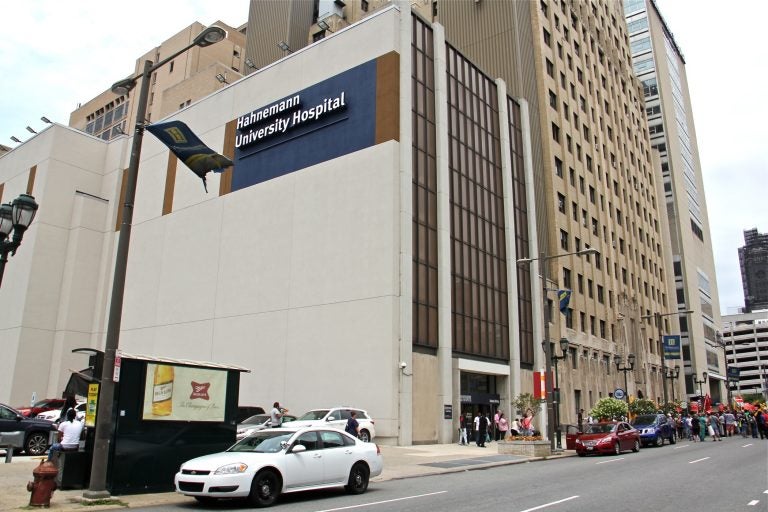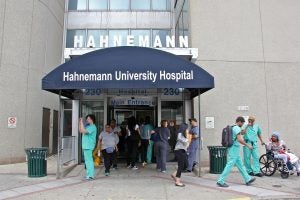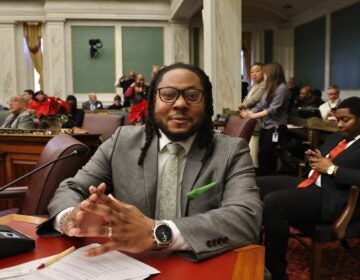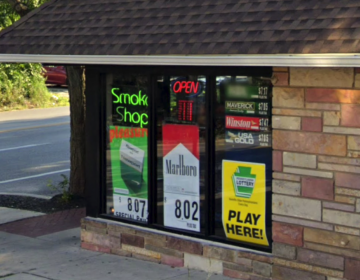Hospital union wants city to rezone Hahnemann property so it can’t be flipped
District 1199C wants a zoning change that would require the hospital property to be used for health care, and prevent developers from building apartments.

Hahnemann University Hospital. (Emma Lee/WHYY)
A union representing workers from Hahnemann University Hospital has a plan it says would keep the property a hospital, and prevent it from being flipped and turned into apartments.
Chris Woods, executive vice president of District 1199C, National Union of Hospital and Health Care Employees — which represented food, patient transportation, maintenance and operations workers at Hahnemann — said the union wants to work with the city to have the property rezoned so it can be used only for medical purposes.
The owner of the money-losing hospital filed for Chapter 11 bankruptcy soon after announcing in late June that it would close, but the property is held by a separate entity and was not included in the bankruptcy filing.
That move, combined with the hospital’s attractive location at Broad and Vine streets at the northern end of Center City, has many speculating that Hahnemann’s owner did not make a good-faith effort to save the hospital, and instead allowed it to fail so its valuable real estate could be sold to developers.
Not if the union can help it. Woods said rezoning would prevent Hahnemann’s owner from profiting from the bankruptcy, and would offset some of the health care jobs eliminated by the closure.
“The zoning piece takes a little bit of the pressure off, because you would at least know that at some point, when somebody comes in, it would remain a hospital,” Woods said. “It can’t just be demolished and built back up.”
Between the hospital and its subcontractors, District 1199C represented more than 700 workers at Hahnemann. Though the hospital technically remains open, most of those workers are out of work and will stop being paid at the end of August. The Pennsylvania Association of Staff Nurses and Allied Professionals, which represented 800 nurses at Hahnemann, is also on board with the plan. But Samir Sonti, a spokesman for PASNAP, said in a best-case scenario none of this would have to happen.
“We’re still fighting to keep the doors open and hope that a potential operator will come forward,” Sonti said.
The U.S. Bankruptcy Court judge presiding over the case has not yet seen or approved an official closure plan for the hospital.
The parent company of Hahnemann’s owner, American Academic Health System, is a subsidiary of California-based Paladin Healthcare, which acquires and lends to struggling hospitals and aims to turn them around. When American Academic Health bought Hahnemann and St. Christopher’s Children’s Hospital in January 2018 from their previous owner, Tenet Healthcare, for $170 million, American Academic recognized the hospital workers’ unions and existing collective-bargaining agreements.
In Woods’ view, because Hahnemann couldn’t find a buyer, maintaining the property for medical use would be the only way to guarantee that the workers represented by District 1199C would keep their union jobs.
American Academic Health’s CEO, Joel Freedman, has said that he attempted to sell Hahnemann to a nonprofit, but that the deal was unsuccessful.
“A new employer would have no obligation to, one, hire the people who had just worked at the hospital, and, two, recognize the union because there was no agreement in place when the hospital shut the door,” Woods said. “Forty years of building a contract up, going back from Allegheny [Health, Education and Research Foundation] and Tenet and now American Academic, would go down the drain.”
Woods said he would like to see the city guarantee that the union’s workers be recalled by the next owner, but before that, it would need to ensure that the building remain a health care facility. The union plans to host a rally in front of the hospital Friday at 3 p.m.
Technically, there are six parcels of land under Hahnemann, two of them beneath the actual hospital. The building is valued at $43.2 million, according to city records. The area is currently zoned CMX5, the Community and Center City Commercial Mixed-Use Districts, the most permissive tier of mixed-use zoning. The current zoning would allow for residential use.
Any zoning change would need to be initiated by City Council, which is not currently in session. Hahnemann’s location in the 200 block of North Broad Street falls in Council President Darrell Clarke’s Fifth District. Woods said his group has been in promising conversations with the council president’s office, which declined to comment for this story.
“Hopefully, when they come back in September, our stuff would be at the top of the list,” said Woods.
The practice of targeting a specific building or parcel and drawing a new zoning map to restrict what can be built there, sometimes known as spot zoning, is a common tactic. But it can also be vulnerable to legal opposition in a case like this. American Academic Health could argue in court that by limiting the potential use, the city was hindering its ability to sell the property, constituting a taking, or an unconstitutional seizure of property.
While there is some precedent in Philadelphia for building categories that would prevent certain medical services from opening, limiting a building to that function would require the creation of a new kind of zoning.
“Each zoning case is unique, and so it is not possible to say whether this has happened before or not,” Paul Chrystie, deputy communications director for the city Planning Department, said in an email.
Though such medical service overlays exist elsewhere, there is nothing currently on the books in Philadelphia.
WHYY is your source for fact-based, in-depth journalism and information. As a nonprofit organization, we rely on financial support from readers like you. Please give today.






